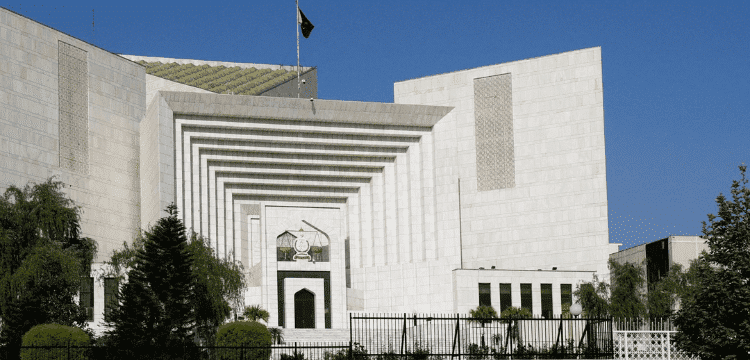[vc_row][vc_column][vc_column_text dp_text_size=”size-4″]ISLAMABAD: The Supreme Court heard petitions against a bill that would limit the power of Pakistan’s chief justice on Thursday and issued notices to the federal government, Attorney General of Pakistan (AGP) Mansoor Awan, political parties, the Pakistan Bar Council, and the Supreme Court Bar Council.
The Supreme Court (Practice and Procedure) Bill, 2023, which seeks to limit the CJP’s powers to initiate suo motu proceedings and constitute benches on his own, was heard by an eight-judge larger bench of the apex court.
As the hearing was adjourned, Chief Justice Umar Ata Bandial stated that the eight-member bench would issue a written order shortly. He maintained that the case was significant because it involved the independence of the judiciary, which had already been declared a fundamental right of citizens.
The larger bench also includes Justices Ijazul Ahsan, Muneeb Akhtar, Mazahar Ali Akbar Naqvi, Muhammad Ali Mazhar, Ayesha Malik, Hasan Azhar Rizvi, and Shahid Waheed, in addition to the CJP.
The petitioner’s lawyers, Advocate Azhar Siddique and Advocate Imtiaz Rashid Siddiqui, as well as the Attorney General of Pakistan (AGP) Mansoor Awan, were present in the courtroom as the hearing began.
Also Read: National Assembly unanimously passes bill to limit CJP’s suo moto powers.
Petitioner Raja Amir’s lawyer, Imtiaz Siddiqui, opened the arguments and stated that the case was of “great importance” due to the ongoing situation. He added that after the Qasim Suri case, the political divide across the aisles had increased significantly.
Siddiqui continued that the political crisis in the country had proliferated after the restoration of the National Assembly.
He further argued that the federal government and the Election Commission of Pakistan (ECP) were not willing to hold elections, thus the court itself had to take notice of the matter and order the ECP to conduct polls.
Also Read: Non-provision of election funds: Supreme Court order expected today
“On April 3, the court ordered elections, however, after the court’s directives to follow the Constitution, more problems were created. The court and judges were criticised personally, ” he said.
Siddiqui held government ministers and parliamentarians responsible for this.
The lawyer stated that the proposed legislation interfered with the independence of the judiciary.
He detailed that after approval from both houses, the bill was sent to the president who raised objections and sent the bill back to the assembly, however, the president’s objections were not reviewed. He added that the bill would become law in ten days after approval by the joint session.
“Under Article 191 of the Constitution, the Supreme Court makes its own rules,” he said.
He stated that under the bill, a three-member committee would decide on the suo motu notices and the formation of benches. He highlighted that the main question was if the bill was worthy of becoming law.
“It is illegal for the Cabinet to ratify the bill. Bill presentation and approval in the cabinet are both administrative matters,” he said, adding that presenting the bill in the NA and getting approval was “unconstitutional”.
Also Read: Ruling allies reject controversial SC bench on bill limiting CJP’s powers
Siddiqui maintained that the bill was not pending but was a proposed act and would become part of the law after the president’s approval.
He clarified that the SC could invalidate the bill passed by the Parliament, adding that the top court could not exist without the CJP.
“The Supreme Court completes its work with the appointment of the CJP and even if there are other judges without the Chief Justice, the court is not complete,” he said.
He argued that the CJP’s and judges’ powers could not be reduced, and that the CJP’s office could not be used by another judge. He was perplexed as to how the CJP’s office could be shared with two other senior judges.
Siddiqui noted that the Supreme Court had issued several decisions on the independence of the judiciary and could review the actions of every state institution.
“The Supreme Court declared in the Qasim Suri case that the actions of Parliament can also be reviewed by the court,” he explained.
He went on to say that the court previously stated that bills could not be stopped from passing; however, if the bill is passed, the court can review it. He added that according to court decisions, the proposed act can be reviewed even before it assents to the president.
According to the lawyer, the current case was governed by Article 184(3) of the Constitution, which stated that the Supreme Court had superior jurisdiction. He emphasised that the SC had previously ordered the demolition of a marriage hall under the Article.
He maintained that all court orders were subject to fundamental rights, and he questioned whether or not the independence of the judiciary was a fundamental right of the people.
He also stated that the proposed law sought to limit the CJP’s powers, but Article 184(3) provided for the right to review rather than appeal. Siddiqui went on to say that a SC judge could not file an appeal against another judge.
“The question is whether Parliament can regulate the judiciary’s internal affairs.”
A large number of lawyers, including pro-PTI lawyers, were present outside the Supreme Court prior to the hearing. Outside the Supreme Court, PTI leader Azam Swati was also present. Lawyers raised slogans against the government and in support of the judiciary.
The SC’s security was beefed up. A large number of Rangers, police, and Frontier Corps (FC) personnel were present both inside and outside the court.

The Petition
So far, three petitions have been filed in the Supreme Court against the bill. Citizens Chaudhry Ghulam Hussain and Raja Aamir Khan filed two of them, represented by lawyers Advocate Tariq Rahim and Azhar Siddique.
Respondents in the petitions include the federation, the law ministry, the principal secretary to Prime Minister Shehbaz Sharif, and the principal secretary to President Dr Arif Alvi.
According to the petitions, the proposed bill was based on “bad faith” and was “fraudulent” with the Constitution. They request that the proposed bill be declared “unconstitutional” and “illegal” by the Supreme Court.
The court has also been asked to stay the proposed law until the petition is resolved and to prevent the president from signing it.[/vc_column_text][/vc_column][/vc_row]











